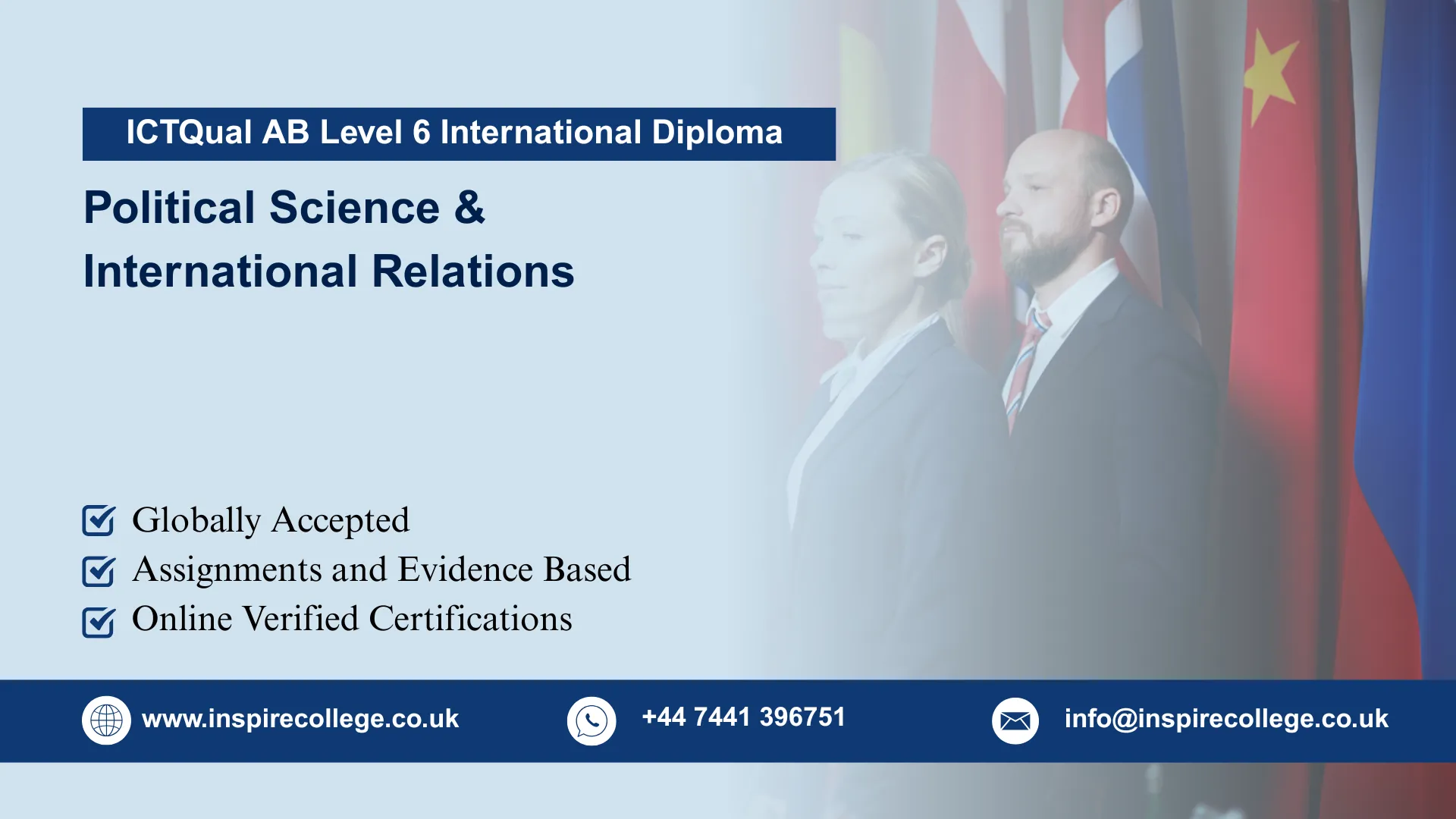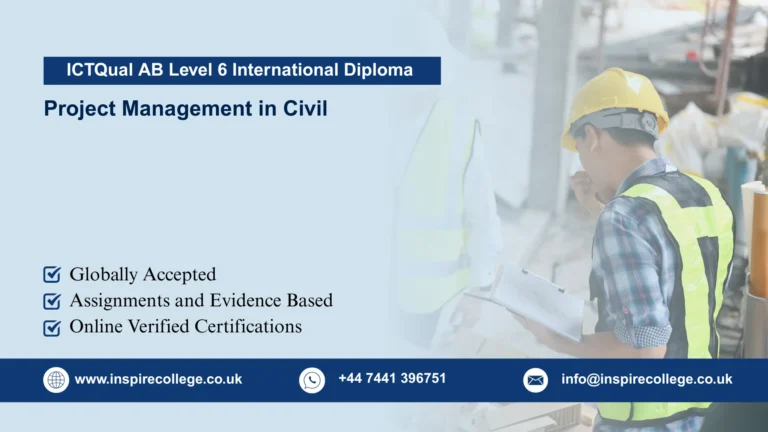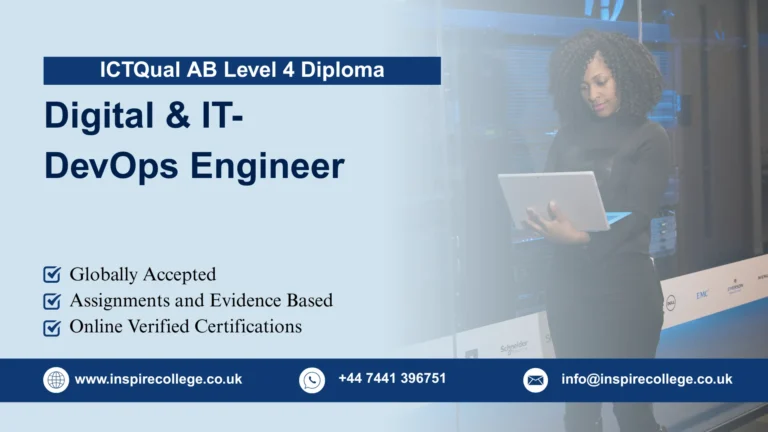
ICTQual AB Level 6 International Diploma in Political Science & International Relations
In today’s interconnected world, understanding political systems, international diplomacy, and global governance is more critical than ever. The ICTQual AB Level 6 International Diploma in Political Science & International Relations is meticulously designed to provide learners with a comprehensive understanding of political theories, international affairs, and policy-making processes that shape the modern world.
This three-year, 360-credit program caters to both freshers and experienced professionals seeking to develop a robust academic foundation and practical expertise in political science and international relations. The course covers a wide range of topics including comparative politics, international law, global security, diplomacy, policy analysis, and governance, providing learners with the analytical tools to evaluate political events and their global implications.
Learners will gain critical skills in research, policy evaluation, negotiation, strategic thinking, and effective communication, equipping them to engage confidently in political analysis, governmental institutions, NGOs, and international organizations. Through a combination of theoretical frameworks and practical assignments, the course ensures learners can apply their knowledge to real-world challenges, from political campaigns to international conflict resolution and policy development.
Upon completion, graduates will be prepared to pursue careers in diplomacy, international organizations, government service, political consultancy, advocacy, and policy analysis. They will emerge as informed, strategic, and capable professionals with the knowledge and skills to influence decision-making, foster international cooperation, and address complex global issues.
The ICTQual AB Level 6 International Diploma in Political Science & International Relations is designed to provide learners with advanced knowledge and practical skills in political analysis, international diplomacy, and governance. To ensure learners are well-prepared to succeed in this rigorous program, the following entry requirements apply:
Age Requirements
- Applicants must be at least 18 years old at the time of enrollment.
- Mature learners above 21 years with relevant professional experience may be considered for advanced entry.
Educational Requirements
- Fresh learners should have a high school diploma or equivalent.
- Applicants with a Level 5 Diploma or higher in Political Science, International Relations, or related fields are eligible for advanced progression.
- Completion of a course such as the ICTQual AB Level 5 International Diploma in Political Science & International Relations is recommended for seamless entry.
Professional Experience
- Candidates with 1–2 years of relevant work experience in political organizations, NGOs, or international agencies are encouraged to apply.
- Experienced professionals without formal qualifications may be considered on a case-by-case basis based on documented work experience.
English Language Proficiency
- Non-native English speakers must demonstrate proficiency through:
- IELTS score of 5.5 or higher, or
- TOEFL equivalent, or
- An equivalent internationally recognized English language qualification.
- Proficiency ensures effective engagement with course materials, discussions, and assessments.
These entry requirements are designed to ensure that all learners are adequately prepared to gain maximum benefit from the ICTQual AB Level 6 International Diploma in Political Science & International Relations, enabling them to excel academically and professionally in political and international arenas.
Mandatory Units
This qualification, the ICTQual AB Level 6 International Diploma in Political Science & International Relations360 Credits – Three Years, consists of 36 mandatory units.
Year 1 – Foundation in Political Science & International Relations
- Introduction to Political Science
- Foundations of International Relations
- Comparative Politics and Government Systems
- Political Ideologies and Theories
- History of Political Thought
- Principles of Public Administration
- Introduction to International Organisations
- Global History and World Politics
- Political Communication and Media Studies
- Research Methods in Political Science
- Human Rights and Social Justice
- Introduction to Diplomacy and Foreign Policy
Year 2 – Intermediate Political Science & International Relations
- Advanced Political Theory and Analysis
- International Law and Global Governance
- Political Economy and Development Studies
- Regional Studies: Europe, Asia, Africa, and the Middle East
- Conflict Resolution and Peace Studies
- Political Sociology and Social Movements
- Policy-Making and Public Policy Analysis
- International Political Economy
- Comparative Foreign Policy
- Security Studies and Global Challenges
- Research Methods and Data Analysis in Politics
- Ethics and Professional Practice in Political Science
Year 3 – Advanced Political Science & International Relations
- Capstone Project in Political Science & International Relations
- Contemporary Issues in International Relations
- Strategic Studies and National Security
- International Diplomacy and Negotiation
- Policy Analysis and Political Reform
- Globalisation and Transnational Politics
- Leadership and Governance in Political Institutions
- International Conflict and Crisis Management
- Political Risk Analysis and Strategic Decision-Making
- Environmental Politics and Global Sustainability
- International Cooperation and Development Projects
- Innovation and Emerging Trends in Global Politics
The ICTQual AB Level 6 International Diploma in Political Science & International Relations equips learners with advanced knowledge, analytical skills, and practical expertise to navigate political systems, international relations, and global governance. Upon completing this program, learners will demonstrate competence in political analysis, policy evaluation, diplomacy, and leadership within national and international contexts.
Year 1 – Foundation in Political Science & International Relations
Introduction to Political Science
- Understand the fundamental concepts, structures, and functions of political systems.
- Analyse key political processes and institutions in various contexts.
- Apply foundational political theory to contemporary issues and case studies.
Foundations of International Relations
- Explain core principles, theories, and concepts of international relations.
- Evaluate global events using theoretical frameworks.
- Demonstrate an understanding of state interactions and global diplomacy.
Comparative Politics and Government Systems
- Compare and contrast different political systems and governance structures.
- Assess political stability, institutions, and processes across nations.
- Apply comparative methods to analyse policy outcomes.
Political Ideologies and Theories
- Examine major political ideologies and their historical development.
- Analyse the influence of ideology on policy, governance, and social movements.
- Apply ideological frameworks to interpret contemporary political issues.
History of Political Thought
- Understand key thinkers and their contributions to political theory.
- Analyse the evolution of political ideas and institutions over time.
- Apply historical insights to contemporary political debates.
Principles of Public Administration
- Explain the role and functions of public administration in governance.
- Analyse administrative structures, processes, and efficiency strategies.
- Apply administrative principles to practical governance challenges.
Introduction to International Organisations
- Identify major international organisations and their roles.
- Evaluate their impact on global politics, security, and development.
- Apply knowledge to understand multilateral cooperation and diplomacy.
Global History and World Politics
- Analyse major historical events and their impact on contemporary politics.
- Demonstrate understanding of global power dynamics.
- Apply historical perspectives to assess current international issues.
Political Communication and Media Studies
- Develop skills in political communication and media analysis.
- Analyse the role of media in shaping public opinion and political discourse.
- Apply communication strategies to engage stakeholders effectively.
Research Methods in Political Science
- Understand qualitative and quantitative research methods in political analysis.
- Design basic research tools and conduct data collection.
- Apply research findings to inform political decision-making.
Human Rights and Social Justice
- Explain principles of human rights and social justice in political contexts.
- Analyse policies and legislation affecting rights protection.
- Apply ethical considerations to promote equity and inclusion.
Introduction to Diplomacy and Foreign Policy
- Understand the fundamentals of diplomacy and foreign policy formulation.
- Analyse bilateral and multilateral relations using practical examples.
- Apply diplomatic principles in case study simulations.
Year 2 – Intermediate Political Science & International Relations
Advanced Political Theory and Analysis
- Apply advanced political theories to complex scenarios.
- Critically evaluate political ideologies, institutions, and policies.
- Develop analytical reports on contemporary political challenges.
International Law and Global Governance
- Understand the principles and frameworks of international law.
- Analyse the role of international law in regulating state behaviour.
- Apply legal principles to case studies in global governance.
Political Economy and Development Studies
- Examine the relationship between politics, economics, and development.
- Analyse policies and strategies for sustainable economic growth.
- Apply political economy frameworks to regional and global contexts.
Regional Studies: Europe, Asia, Africa, and the Middle East
- Understand political, social, and economic dynamics of key regions.
- Analyse regional conflicts, governance, and development challenges.
- Apply comparative approaches to regional policy analysis.
Conflict Resolution and Peace Studies
- Develop strategies for conflict prevention, management, and resolution.
- Analyse case studies of international and civil conflicts.
- Apply negotiation and mediation techniques in practical exercises.
Political Sociology and Social Movements
- Examine the interaction between society, politics, and social movements.
- Analyse causes, strategies, and impact of collective action.
- Apply sociological insights to political engagement and activism.
Policy-Making and Public Policy Analysis
- Understand the stages of policy-making and policy evaluation.
- Analyse the effectiveness of public policies using evidence-based methods.
- Apply analytical tools to design and evaluate policy interventions.
International Political Economy
- Explore global trade, finance, and economic policy frameworks.
- Analyse the influence of economic factors on international relations.
- Apply economic analysis to real-world political scenarios.
Comparative Foreign Policy
- Examine different countries’ foreign policy strategies and objectives.
- Analyse the impact of culture, history, and ideology on foreign policy.
- Apply comparative methods to assess diplomatic approaches.
Security Studies and Global Challenges
- Understand global security issues including terrorism, cyber threats, and climate risks.
- Analyse strategies for national and international security.
- Apply security frameworks to policy and strategic decision-making.
Research Methods and Data Analysis in Politics
- Conduct in-depth qualitative and quantitative research.
- Analyse political data to support evidence-based policy decisions.
- Present research findings clearly and professionally.
Ethics and Professional Practice in Political Science
- Understand ethical principles and professional standards in political work.
- Apply ethical reasoning to research, policy, and diplomacy.
- Demonstrate integrity and accountability in professional practice.
Year 3 – Advanced Political Science & International Relations
Contemporary Issues in International Relations
- Analyse emerging global political issues and trends.
- Evaluate the implications of geopolitical shifts and crises.
- Apply strategic thinking to contemporary international challenges.
Strategic Studies and National Security
- Understand national security frameworks and strategies.
- Analyse military, political, and economic dimensions of security.
- Apply strategic planning tools to hypothetical security scenarios.
International Diplomacy and Negotiation
- Develop advanced diplomatic negotiation skills.
- Analyse international treaties, agreements, and conflict resolution processes.
- Apply negotiation strategies in simulations and case studies.
Policy Analysis and Political Reform
- Critically evaluate existing policies and propose reforms.
- Apply analytical frameworks to assess political effectiveness.
- Develop actionable recommendations for governance improvements.
Globalisation and Transnational Politics
- Examine the impact of globalisation on politics, economies, and societies.
- Analyse transnational governance, NGOs, and international networks.
- Apply insights to manage global political and economic interactions.
Leadership and Governance in Political Institutions
- Develop leadership and decision-making skills within political organizations.
- Analyse governance structures and institutional effectiveness.
- Apply management strategies to political and administrative contexts.
International Conflict and Crisis Management
- Understand causes and dynamics of international conflicts.
- Analyse strategies for crisis prevention, negotiation, and resolution.
- Apply conflict management techniques in simulations and case studies.
Political Risk Analysis and Strategic Decision-Making
- Identify, assess, and mitigate political risks in national and international contexts.
- Apply risk assessment frameworks to policy and business scenarios.
- Develop strategic plans informed by political risk analysis.
Environmental Politics and Global Sustainability
- Examine the political dimensions of environmental issues and climate change.
- Analyse policies and frameworks for sustainable development.
- Apply environmental governance strategies to global and local contexts.
International Cooperation and Development Projects
- Understand mechanisms of international cooperation in development.
- Analyse projects aimed at social, economic, and political development.
- Apply project management principles to real-world development initiatives.
Innovation and Emerging Trends in Global Politics
- Identify emerging trends, technologies, and innovations shaping global politics.
- Analyse their impact on governance, diplomacy, and security.
- Apply innovative approaches to political problem-solving.
Capstone Project in Political Science & International Relations
- Plan, execute, and present a major research or policy project.
- Integrate knowledge, analytical skills, and practical expertise from the program.
- Demonstrate professional competence in addressing complex political or international challenges.
The ICTQual AB Level 6 International Diploma in Political Science & International Relations is designed for learners who aspire to excel in political analysis, diplomacy, policy-making, and global governance. This program is suitable for both freshers seeking to build a career and experienced professionals aiming to enhance their expertise and leadership skills in political and international affairs.
1. Recent Graduates
- Individuals who have completed high school, college, or a Level 5 diploma.
- Seeking a structured pathway to develop foundational and advanced knowledge in political science and international relations.
2. Working Professionals
- Individuals already working in government institutions, NGOs, international organizations, or policy research roles.
- Looking to enhance their knowledge, analytical skills, and career prospects in political and diplomatic sectors.
3. Aspiring Leaders and Policy Makers
- Learners aiming for leadership positions in political institutions, international agencies, or advisory roles.
- Interested in contributing to policy formulation, strategic decision-making, and global governance initiatives.
4. Socially and Globally Conscious Individuals
- Those passionate about human rights, social justice, and global cooperation.
- Motivated to address complex political challenges and participate in international development programs.
5. Analytical and Research-Oriented Learners
- Individuals seeking to develop critical thinking, research, and data analysis skills in political and international contexts.
- Interested in applying theoretical knowledge to real-world political, policy, and diplomatic scenarios.
This program is ideal for learners who wish to combine rigorous academic training with practical skills, preparing them to excel in political, diplomatic, and international careers while making a meaningful impact in global affairs.
As an approved ICTQual AB centre, we provide learners with the opportunity to enrol in the ICTQual AB Level 6 International Diploma in Political Science & International Relations through structured certification routes designed for both experienced professionals and fresh learners.
1. Certification Route for Experienced Professionals
- Designed for learners with at least 6 years of verifiable experience in political institutions, government agencies, international organizations, or related fields.
- Professionals can fast-track their certification by submitting a portfolio of work demonstrating relevant skills, achievements, and expertise.
- Prior practical experience is assessed to ensure it aligns with the standards of the Level 6 diploma.
- Upon successful verification, learners will be awarded the ICTQual AB Level 6 International Diploma without completing the full set of assignments, recognizing their professional competence and experience.
2. Certification Route for Fresh Learners
- Suitable for recent graduates or individuals with limited professional experience in political science or international relations.
- Learners are required to complete all 36 assignments covering theoretical knowledge, practical applications, research, and policy analysis.
- Assignments are structured to develop skills in diplomacy, governance, political analysis, international law, and global strategic thinking.
- Successful completion of all assignments leads to the award of the ICTQual AB Level 6 International Diploma, ensuring mastery of the program content and practical competencies.
Enrolment is available directly through our approved ICTQual AB centre, providing learners with full support, access to study materials, and guidance throughout their learning journey. Whether you are an experienced professional seeking recognition for your expertise or a fresh learner aiming to build a strong foundation, our certification routes offer a globally recognized pathway to success in political science and international relations.
Register Now
FAQs for ICTQual AB Level 6 International Diploma in Political Science & International Relations






